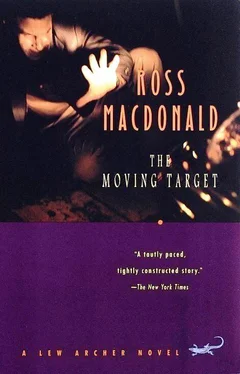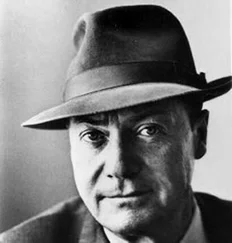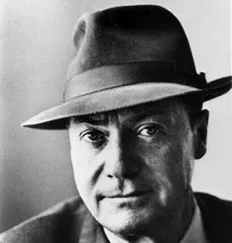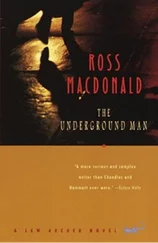“My name is Lew,” I said. “I must have heard of you.”
“I’m Betty Fraley.” The statement had a margin of regret like a thin black border on a card. The name didn’t mean anything to me, but it did to her.
“I remember you.” I lied more boldly. “You got a tough break, Betty.” All snowbirds wore stigmata of bad luck.
“You can say it twice. Two years in a white cell, and no piano. The conspiracy rap was a hummer. All they could prove was I needed it myself. They took me for my own good, they said. Their own good! They wanted publicity, and my name was known. It isn’t any more, and if I ever kick the habit, it won’t be with the help of the feds.” Her red mouth twisted over the wet red end of the cigarette. “Two years without a piano.”
“You do nicely for a girl that’s out of practice.”
“You think so? You should have heard me in Chicago when I was at my peak. I draped the piano over the beams in the ceiling and swung from the keys. You heard my records, maybe.”
“Who hasn’t?”
“Were they like I said?”
“Marvelous! I’m crazy about them.”
But hot piano wasn’t my dish, and I’d picked the wrong words or overdone my praise.
The bitterness of her mouth spread to her eyes and voice. “I don’t believe you. Name one.”
“It’s been a long time.”
“Did you like my Gin Mill Blues?”
“I did,” I said with relief. “You do it better than Sullivan.”
“You’re a liar, Lew. I never recorded that number. Why would you want to make me talk too much?”
“I like your music.”
“Yeah. You’re probably tone-deaf.” She looked intently into my face. The mutable eyes had hard, bright diamond centers. “You could be a cop, you know. You’re not the type, but there’s something about the way you look at things, wanting them but not liking them. You got cop’s eyes – they want to see people hurt.”
“Take it easy, Betty. You’re only half psychic. I don’t like to see people hurt, but I’m a cop.”
“Narcotics?” Her face was brushed by white terror.
“Nothing like that. A private cop. I don’t want anything from you. I just happen to like your music.”
“You lie.” In spite of her hatred and fear she was still whispering. Her voice was a dry rustle. “You’re the one that answered Fay’s phone and said you were Troy. What do you think you’re after?”
“A man called Sampson. Don’t tell me you haven’t heard of him. You have.”
“I never heard of him.”
“That’s not what you said on the phone.”
“All right, I’ve seen him in here like anybody else. Does that make me his nurse? Why come to me? He’s just another barfly in my book.”
“You came to me. Remember?”
She leaned toward me, projecting hatred like a magnetic field. “Get out of here and stay out.”
“I’m staying.”
“You think.” She jerked a taut white hand at the waiter, who came running. “Call Puddler. This jerk’s a private cop.”
He looked at me with uncertainty tugging at his blue-black face.
“Take it easy,” I said.
She stood up and went to the door behind the piano. “Puddler!” Every head in the room jerked up.
The door sprang open, and the man in the scarlet shirt came out. His small eyes moved from side to side, looking for trouble.
She pointed a finger at me. “Take him out and work him over. He’s a peeper, trying to pump me.”
I had time to run, but I lacked the inclination. Three runouts were too many in one day. I went to meet him and took the sucker punch. The scarred head rolled away easily. I tried with my right. He caught it on the forearm and moved in.
His dull eyes shifted. I had the funny feeling that they didn’t recognize me. One fist came into my stomach. I dropped my guard. The other came into my neck below the ear.
My legs were caught by the edge of the platform. I fell against the piano. Consciousness went out in jangling discord, swallowed by the giant shadow.
At the bottom of a black box a futile little man was sitting with his back against something hard. Something equally hard was hitting him in the face. First on one side of the jaw, then on the other. Every time this happened his head bounced once against the hard surface behind him. This distressing sequence – the blow followed by the bounce – continued with montonous regularity for a considerable period of time. Each time the fist approached his jaw the futile man snapped at it futilely with his aching teeth. His arms, however, hung peacefully at his sides. His legs were remarkably inert and distant.
A tall shadow appeared at the mouth of the alley, stood one-legged like a stork for an instant, then limped grotesquely toward us. Puddler was too absorbed in his work to notice. The shadow straightened up behind him and swung one arm high in the air. The arm came down with a dark object swinging at the end of it. It made a cheerful sound, like cracking walnuts, on the back of Puddler’s head. He knelt in front of me. I couldn’t read his soul in his eyes because only the whites were showing. I pushed him over backward.
Alan Taggert put his shoe on and squatted beside me. “We better get out of here. I didn’t hit him very hard.”
“Let me know when you’re going to hit him hard. I want to be present.”
My lips felt puffed. My legs were like remote and rebellious colonies of my body. I established mandates over them and got to my feet. It was just as well I couldn’t stand on one of them. I would have kicked the man on the pavement and regretted it later – several years later.
Taggert took hold of my arm and pulled me toward the mouth of the alley. A taxi with one door open was standing at the curb. Across the street the stucco entrance of the Wild Piano was deserted. He pushed me into the cab and got in after me.
“Where do you want to go?”
My brain was a vacuum for an instant. Then anger surged into the vacuum. “Home to bed, but I’m not going. Swift’s on Hollywood Boulevard.”
“They’re closed,” the driver said.
“My car’s in their parking lot.” And my gun was in the car.
We were halfway there before my brain caught up with my tongue. “Where in hell did you come from?” I said to Taggert.
“Out of the everywhere into the here.”
I snarled at him: “Don’t double-talk. I’m not in the mood.”
“Sorry,” he said seriously. “I was looking for Sampson. There’s a place back there called the Wild Piano. Sampson took me there once, and I thought I’d ask them about him.”
“That’s what I thought I’d do. You saw the answer they gave me.”
“How did you happen to go there?”
I couldn’t be bothered explaining. “I stumbled in. Then I stumbled out.”
“I saw you coming out,” he said.
“Did I walk out?”
“More or less. You had some help. I waited in the taxi to see what gave. When the bruiser took you into the alley I came in after you.”
“I haven’t thanked you,” I said.
“Don’t bother.” He leaned toward me and said in an earnest whisper: “You really think Sampson’s been kidnapped?”
“I’m not thinking so well just now. It’s one idea I had when I was having ideas.”
“Who would have kidnapped him?”
“There’s a woman named Estabrook,” I said, “a man named Troy. Ever meet him?”
“No, but I’ve heard of the Estabrook woman. She was with Sampson in Nevada a couple of months ago.”
“In what capacity?” My bruised face felt like leering. I let it leer.
“I wouldn’t know for sure. She went there by car. The plane was out of commission, and I was in Los Angeles with it. I never got to see her, but Sampson mentioned her to me. As far as I could tell, they sat around in the sun talking about religion. I think she’s a sidekick of this holy man Claude. The one Sampson gave the mountain to.”
Читать дальше












